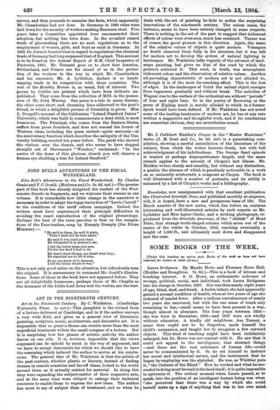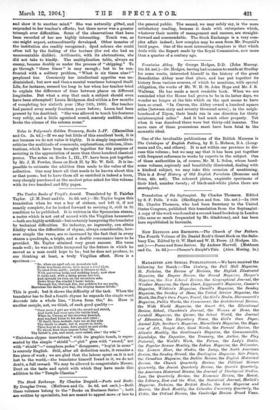[Under this heading we notice ouch Books of the week
as halm not been reserved for review in other forms.] Laura Bridgman. By Maude Howe and Florence Howe Hall. (Hodder and Stoughton. 7s. 6d.)—This is a book of intense and touching interest. S. G. Howe, an enthusiastic redresser of wrongs, political, social, and individual, took Laura Bridgman into his charge in October, 1837. She was then nearly eight years of age, blind, deaf, and dumb. A feeble infant, she had apparently gained a normal condition of health, when at two years of age she sickened of scarlet fever. After a tedious convalescence of nearly two years she recovered, but with the one sense of touch only remaining to her,—smell seems to have been present in a way, though almost in abeyance. The four years between 1833— she was born in December, 1829—and 1837 were not wholly without education. A kindly old neighbour, Asa Tenney, a name that ought not to be forgotten, made himself the child's companion, and taught her to recognise a few outward objects. This kind of teaching might have been indefinitely enlarged, but Dr. Howe was not content with it. He saw that it could not appeal to the intelligence, that abstract things —and these are the real substance of human life—could never be communicated by it. So he set himself to instruct her moral and intellectual nature, and the instrument that he began by employing was the alphabet. He was, as Whittier puts it, "the Cadmus of the Blind." How he worked and what he suc- ceeded in doing must be read in the book itself; it is quite impossible to epitomise it. The critical moment when Laura passed, so to speak, into the position of an intelligent human being was when "she perceived that there was a way by which she could herself make up a sign of anything that was in her own mind. and show it to another mind." She was naturally gifted, and responded to her teacher's efforts ; but there never was a greater triumph over difficulties. Some of the observations that have been recorded of her are highly interesting. Touch was, as one might expect, extraordinarily developed. Other inmates of the institution she readily recognised ; dyed colours she could often tell by the feeling of the texture (for red she had an unaccountable dislike). Arithmetic, with its abstractions, she did not take to kindly. The multiplication table, always an enemy, became doubly so under the process of "skipping." To go through "three times" is easy enough ; but to be con- fronted with a solitary problem, "What is six times . nine ? " perplexed her. Commonly her intellectual appetite was un- diminished; but now and then& mental weariness betrayed itself. Life, for instance, seemed too long to her when her teacher tried to explain the difference of time between places on different longitudes. But what a step that such a subject should even have been attempted ! Laura Bridgman died within a few months of completing her sixtieth year (May 24th, 1889). Her teacher had passed away nearly fourteen years before; Laura had been present by his deathbed. "She was allowed to touch his features very softly, and a little agonised sound, scarcely audible, alone broke the silence of the solemn scene."











































 Previous page
Previous page